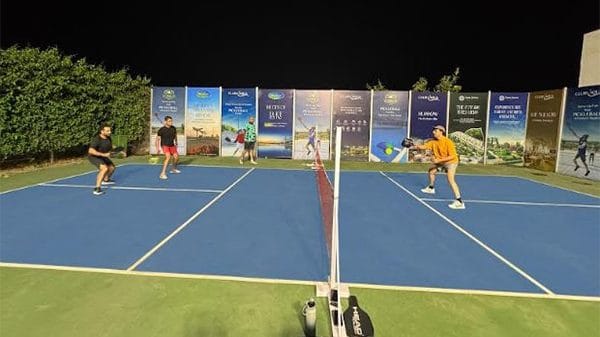There was a time when playing didn’t need planning. You stepped out, and the day decided the game. Cricket if there were enough kids. Badminton if someone had a shuttle. A half-flat football if you were lucky. Evening light, neighbour’s steps, an empty lane — that was the whole sports infrastructure. No slots, no apps. Just a knock on the door: “Let’s play?”
Today, that spontaneity sits alongside a very different kind of sporting culture — pickleball, padel, paddleball, turf cricket, and so on. These sports are fun. People get hooked. But they come with a layer of planning our childhood never needed. You need a court. You need a group. You need everyone to be free at the same time. You need the booking app to cooperate. You need money, often a lot. An hour costs anywhere from a few hundred to a few thousand. Shoes, paddles, grips, memberships. Play has been packaged and priced.
And because it costs money, it also draws a line. The people playing these sports and the ones who don’t are not living in the same sporting world anymore. One group books slots. The other struggles to find time, sometimes money. The difference is not interest or passion — it is simply access.
Scheduled fun?
I absolutely admit that pickleball and the rest of the new-age sports are great fun. They get adults moving, they build friendships, they give people something to look forward to. But somewhere along the way, play became a scheduled activity instead of something that just happened. It became a slot you could miss, a plan you had to stick to, an hour you paid for and better not waste. We have turned something spontaneous into something that requires logistics.
In the 1990s, when I was growing up, the games we’d play weren’t even real sports. We had one where the streets were ‘water’ and the footpath or steps to someone’s house was ‘land.’ One friend would be the ‘crocodile’ who’d try to catch someone as the rest of us leapt from step to step, screaming, cheating, negotiating new rules every two minutes. ‘Kumir-danga’ — crocodile-land — we called it in Bangla. The game needed only friends, some imagination, and a neighbourhood that tolerated noise.
That kind of play is disappearing today; slowly fading out as cities reshape themselves. Streets are crowded, open spaces are shrinking, many parks have rules, and parents are more cautious. So, kids are indoors. Some are glued to screens. Some are in tuition classes. And the ones who don’t have gadgets or structured schedules are still out on the roads — rolling a tyre with a stick, kicking a plastic bottle, making up their own games the way we once did. They play with whatever they have because that’s the only option for them. They don’t have access to clubs, coaches, glass-box courts or paid “sessions.” The city gives them leftovers and expects them to make do.
Also read: Granta’s India issue goes into the heart of ‘vikas’. Restlessness written all over it
Lost freedom
For adults, the idea that you can ‘just play’ has vanished. You cannot show up alone with a racket and hope someone will join. You need your friends to be free from work or family commitments. You need to find a place where you can play. Today, playing has rules before the game even begins.
That’s what feels strange now. The freedom we grew up with — the ability to step out and instantly be part of a game — doesn’t exist in the same way anymore. For many kids, sport now sits at two extremes: fully organised and paid for, or completely improvised on the last bits of remaining open space. Nothing in between.
Maybe that’s why those old, childhood games stay with us. They remind us of a time when playing did not depend on money, timing or infrastructure. Whatever the game, it adapted to you and not the other way around.
Cities will keep growing. Courts will keep multiplying. New sports will take over Instagram Stories. That is fine by me. Everyone deserves the right to play whatever they enjoy. But we also need to hold on to the simplest idea of play — the kind that can happen anywhere, with anyone, without needing a debit card or a time slot.
And maybe, once in a while, it should still feel like jumping from ‘water’ to ‘land’ with a crocodile right behind you.
Views are personal.
(Edited by Aamaan Alam Khan)






